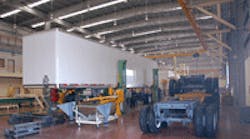On another day of wild swings on Wall Street, FTR Associates issued this advice: Don’t panic…yet.
Yes, FTR’s Jonathan Starks said in a webinar Thursday, the volatility of stock market is leading to uncertainty, making it difficult for decision-makers to make decisions. But the company is not forecasting an actual decline in truck and trailer production. It does, however, expect growth to slow or even flatten out.
Eric Starks, president of FTR Associates and the company’s senior consultant, said recent economic turbulence has led him to revise his production forecast downward. He originally expected a healthy increase in truck and trailer production for 2011.
The slower growth may actually be somewhat welcome news for some in the supply chain, Starks said in a question-and-answer session following the formal presentations. Some suppliers have been hard pressed to provide components after a lack of demand in recent years led companies to let the pipeline run dry.
What’s happening with freight
Larry Gross, senior consultant for FTR Associates, gave a quick review of the freight markets.
“The message is not a terrible one,” he said. “While the growth in freight is slowing, it has not gone negative.”
Gross cited Association of American Railroads data as an indicator of freight because it is available within a week or two of the time it was measured. At last report (week 31 of 2011), freight still was ahead of a year ago.
Eric Starks addressed the outlook for the trucking industry. On the positive side, America does not have a lot of inventory on the shelf. This means that even with a slowdown, goods will continue to flow. By contrast, freight levels fell sharply in the early phases of the past downturn as retailers and others did not need to replenish the shelves. They simply drew down their inventory.
Even so, manufacturing represents the bulk of what moves on trucks, and it has dropped off recently.
“It’s too early to call for a recession,” Starks said, “but the manufacturing data reaffirm that things are slowing down.”
Among the other factors he cited:
•Truckers continue to show healthy profits.
•Freight rates are high
• Capacity of fleets remains tight.
•Drivers still hard to find and will get worse with the advent of new hours of service, electronic onboard recorder and CSA regulations.
•Further into the future, Starks believes the new fuel economy regulations will add about $6,500 to the cost of a new truck.
•The FTR Trucking Conditions Index has eased over the last several months. Starks expects a modest improvement in the index as we go through the rest of the year--unless economy takes a major dive.
A slowdown in economic growth (down to 1-2%) may not have a major impact on trucking, Starks said.
“The trucking industry is at 95% of capacity right now,” he explained. “A slower economy may push that to 90%. This could cause a slight uptick in trucking bankruptcies. But the good news is reduced fuel prices, which could offset the effect of a slower economy.”
Starks expects slightly lower truck sales in the coming months.
Continue reading "FTR lowers growth forecast"Hot spot in the market
Gross characterized the recent performance of intermodal as “the shining star of surface freight.” It has been moving up significantly in recent months, including a 9% rise in June.
Domestic intermodal is in record territory, Gross said. The index for intermodal traffic reached a record high in 2008 when its climbed to 130.7. Its three-month moving average is now 130.8.
Gross said that:
• Trailers are showing up on rails more frequently in recent months. He said this is an indication of new traffic. More established intermodal companies tend to use containers.
•More 53-ft trailers are riding the rails.
•Intermodal market share is slowly increasing.
•The length of haul is decreasing.
Economic outlook
Bill Witte, a principal with Witte Econometrics and an FTR Associates economist said that revised data from the past three years shows that we endured a recession that was actually worse than we thought. Worse yet, recent governmental actions have been ineffective and even harmful.
Policy has been part of the problem, Witte said. Fiscal stimulus has had only temporary effects. Monetary policy has gone from essential to counter-productive—providing no significant long-run effects and making the deficit worse.
He said the economy will struggle through next year. The economy is expected to grow on average 2.2% next three quarters, improving slightly in 2012. The modest growth will lead to modest improvement in unemployment.
But this is almost a best-case scenario.
Potential pitfalls, Witte said, include the continued anti-confidence struggle among Congress, Obama, and the Federal Reserve; collateral damage from the S&P downgrade; banking crisis in Europe; and a possible slowdown in the Chinese economy.
A couple of positives: oil prices, are down and interest rates in the United States should remain low because the world continues to believe that the U S is a safe place to invest. The situation, Witte said, was worse in Europe where banks are highly leveraged, and there is considerably more suspect government debt.
The housing market will continue to struggle, Witte said. He believes that we are more than a year away from getting inventories back in balance. Commercial construction will be equally slow because of a lot of overbuilding that has already taken place in the commercial market.
What might happen
Witte presented four economic scenarios:
1. The recovery could take off unexpectedly. He guessed that there was a 5-10% chance of that happening.
2. The economy could experience relatively low growth for the next 18 months—better than what we have been experiencing recently. Odds of that: 40%.
3. A growth recession. The economy does not shrink, but it grows less than 2% growth. Best guess: 25%.
4. Negative growth. About a 25% chance.
The company will provide detailed forecasts, analysis, and networking opportunities during the two-day FTR 2011 Conference, September 13-15 in Indianapolis.









